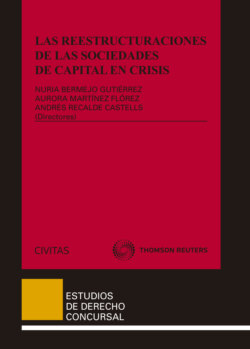Читать книгу Las reestructuraciones de las sociedades de capital en crisis - Aurora Martínez Flórez - Страница 61
На сайте Литреса книга снята с продажи.
I. INTRODUCTION
ОглавлениеThe introduction of rules that can overcome the veto power of shareholders against a restructuring proceeding of their company is one of the main aim in the most recent reforms, about insolvency legislations of the more advanced continental legal systems and in the recent EU directive about preventive restructuring framework, so as to represent a "European-wide movement".
In such a context, German ESUG reform is very important to understand exactly the matter that will be investigated thoroughly below1). ESUG-reform of German Insolvency law (InsO) has openly pursued the goal of removing the veto power of equity holders regarding restructuring plans that involve their position within the company, in order to make the approval of a Sanierungsplan that can results in the best creditors interest easier. This aim has been achieved providing in the Insolvenzordnung for the inclusion of shareholders –or rather of their Anteils- und Mitgliedschaftsreche– in the Insolvenzplan (§ 217, Abs. 2, InsO) in the same position of creditors, so that the possible shareholders veto against the enforcement of the restructuring plan is overcomed by extending insolvency law mechanisms and rules –among which, in particular, the Obstruktionverbot 2)– to equity holders3).
France Code de commerce has also been affected by significant and recent legislative developments concerning the above-mentioned problem: we can find new rules about this matter in art. L631-9-1 Code de commerce introduced by the ordonnance nº 2014-326 of 12 March 2014 and then in the new art. L631-19-2 more recently introduced by the Law of 10 July 2015 (so called Loy Macron) for bigger companies.
In Spain, again, we can find a rule [art. 165.2 Ley concursal (L.c.)] –providing for shareholders responsibility to have led to insolvency or to have deepened it– to induce shareholders to cooperate in the corporate decisions (thecapitalization de créditos or a emisión de valores or instrumentos convertibles) that affect their participations and that are necessary for the fulfilment of an acuerdo de refinanciación (art. 71 bis.1 and fourth additional rule of Ley concursal)4) or of an extra-judicial agreement of payment.
The need to prevent shareholders from blocking unreasonably the approval of restructuring plans, which would bring the debtor-company back to viability, is one of the fundamental aim also of the EU directive on preventive restructuring frameworks (see art. 12 and recital 29) and of the EU Commission recommendation of 12 March 2014 (2014 / 135 / EU: s. recital 29 and art. 12, paragraph 1). Shareholders treatment outlined in the directive appears, moreover, to be strongly influenced by the provisions of German ESUG.
That said, the following analysis deals with the position of equity holders in Italian agreement with creditors (concordato preventivo) –with particular attention to their rationale, to the shareholders preferential right to subscribe new shares in the event of a capital increase in the restructuring proceeding, to the shareholders protection in this case– pursuant to the rules introduced for the first time in Italian bankruptcy law (I.b.l.) by the decree-law 83/2015 and that will be replace by similar rules provided by the new Italian crisis code (I. crisis c.). The analysis will apply the follow principle: between the functions of comparative law, there is also the one of "instrument for the interpretation and reconstruction of the domestic law, especially in order to the rules transplanted from other legal systems"5), as articles 163, paragraph 5 and 185, paragraph 6, I.b.l. and the new articles 90, paragraph 6 and 118, paragraph 6, I. crisis c. can be considered.
